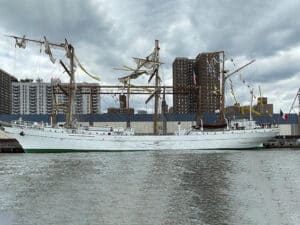
New voices weigh in on impact of USTR’s proposed port fees on China-built ships
Written by Nick Blenkey
OOCL Iris, which set a size record on its recent call in Port of Savannah, was built in China. Would proposed port fees see fewer such calls?[Photo: Georgia Ports Authority]
More concerns are being raised about the port fees that the U.S. Trade Representative (USTR) proposes be placed on Chinese-built ships.
As Peter Sands, chief shipping analyst at Xeneta noted last week, containership operators are looking at their options.
Now the trade association for those operators, the World Shipping Council (WSC) has released its assessment of the likely impact of the port fees should they be imposed.
Meantime, in a reminder that the fees would not only apply to containerships, Poten and Partners has been looking at how they might affect the tanker sector.
WSC notes that the USTR proposals include a per port entry fee of up to $1.5 million on Chinese-built vessels, and up to $1 million per port entry fee of any vessel (Chinese built, or non-Chinese-built) to an operator that has a Chinese-built vessels its fleet or on order.
“The USTR’s proposed port fees could add $600–$800 per container—which would double the cost of shipping U.S. exports,” says WSC. “USTR’s proposed fees apply to vessels already built and serving the U.S. trade or under construction, which would not disincentivize current shipbuilding practices.”
“98% of ships that call on U.S. ports could be affected by USTR’s proposals, “ says WSC president and CEO Joes Kramek. “Policymakers must reconsider these damaging proposals and seek alternative solutions that support American industries.”
According to WSC, if imposed, the fees would amount to an additional tax on American consumers of up to $30 billion annually. In its view, as the majority of proposed fees would apply to existing vessels or vessels under construction, this would not disincentivize current shipbuilding practices.
TANKER MARKET IMPACT
In its most recent Tanker Opinion, Poten and Partners says that, based on data from freight pricing portal Vortexa, tankers made an estimated 12,108 U.S port calls in 2024
“We don’t know how many of these calls were made by Chinese operators or operators with Chinese built vessels in their fleet or operators with newbuildings on order at Chinese shipyards,” says Poten. “However, if we take a look at the current tanker fleet and the orderbook, we can get a general feel for the numbers.
“As per February 1st, the total tanker fleet of vessels >10,000 dwt consists of some 6,907 ships, of which 1,548 (22%) are built in China. Out of the total orderbook of 1,130 tankers, 788 (70%!) are being built in China.
“In the highly competitive oil transportation market, a tanker that is subject to any of the proposed additional port fees will be instantly uncompetitive. As a result, Chinese tanker operators will no longer call on U.S. ports. International operators that own both Chinese and non-Chinese built tankers will keep their Chinese vessels out of the U.S. trades. To avoid the ‘additional fees’ international owners with vessels on order in China will also no longer call on the U.S. Some of these owners may try to sell their Chinese newbuildings and switch to Korean yards. It will create a two-tier market where Chinese built vessels are discounted relative to Korean or Japanese built vessels.
“U.S. charterers would have access to a smaller pool of vessels and may face higher freight costs. Overall, the implementation of these measure could lead to a reshuffling of trade flows and create more inefficiencies in the tanker market.”




